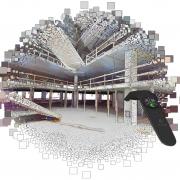U-CREATE is initiated by Alterface, Imagination and ion2s, three SMEs which are primarily active in the field of edutainment, i.e. the joining of education and entertainment (customers are museums, cultural institutions, entertainment parks¿) They share a common and important problem: efficient content creation. Be it interactive setups, Mixed Reality experiences, location-based services, all these technologies are worthless without content: content is always to be tackled or delivered at the same time as technology. However, content creation is a long process that can turn to nightmare when implementing large-scale projects. The solution is two words: authoring tool. A powerful, graphical, beyond the state-of-the-art authoring tool is needed that allows one to create elaborated contents in a fast and easy way. No such tool exists to date due to the highly innovative products commercialized by the SMEs. Such a tool will be created by the project. The authoring tool will increase competitiveness, because it significantly shortens production time (50% reduction of integration time) and effort (creation process affordable to non-specialists) for content development. It will also enable other people to create contents for the intended systems: SMEs can then sell more software while subcontracting or licensing the content production. It will also strengthen the European position in an authoring market dominated by US companies. SMEs alone cannot afford such a task, in terms of expertise but also in terms of resources. This project gathers the highly-specialized expertise from ZGDV, TUW and DIST which allows for the delivery of a prototype authoring tool. HadroNet will be the end-user serving the consortium and helping it to gather a larger community of end-users, in order to assess requirements, validate results and construct the basis of a commercial distribution system. Doing so, the project will set the first basis of a longer-term collaboration amongst all partners.
Funding
- EU IST - 6th Framework Program
Research Areas
In this area, we focus on user experiences and rendering algorithms for virtual reality environments, including methods to navigate and collaborate in VR, foveated rendering, exploit human perception and simulate visual deficiencies.
